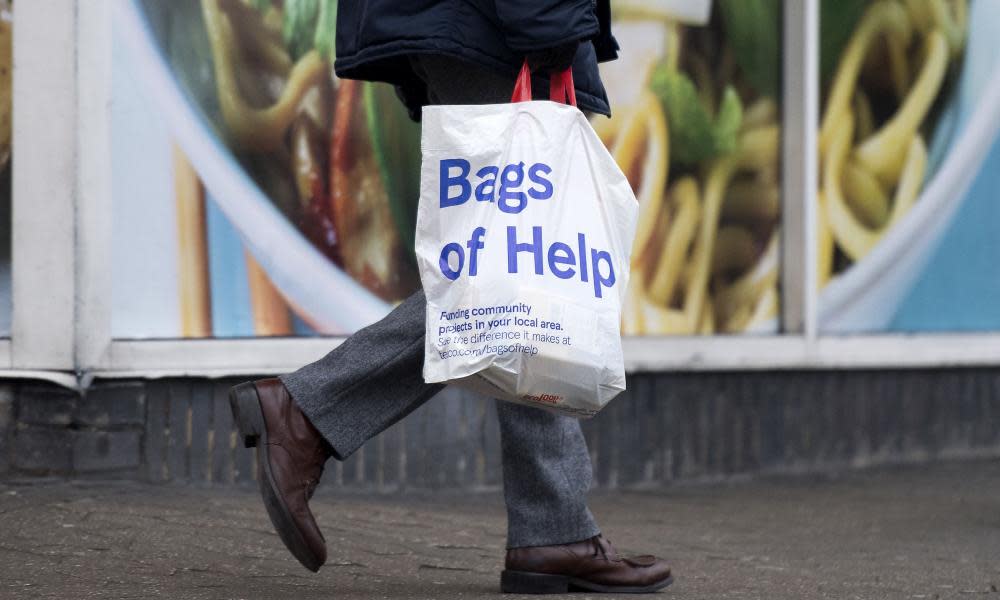Supermarket ‘bags for life’ must cost more to cut plastic use, urge campaigners

Green campaigners have urged higher prices for so-called bags for life after dramatic sales increases at some retailers since the ending of sales of single-use plastic carrier bags.
Marks & Spencer sold six times as many bags for life in 2019 as the year before, up from 13.4m to 82.6m, according to figures from Greenpeace and the Environmental Investigation Agency (EIA). Iceland tripled its sales, to 107.3m from 34m the previous year.
On Monday, the government will introduce legislation to raise the charge on single-use bags from 5p to 10p and extend the charge to cover small and independent shops, as well as the large chains. But campaigners say this has become irrelevant because most supermarkets have scrapped carrier bags and now shoppers are buying bags for life, with substantially more plastic, for as little as 20p.
Supermarkets sold 1.58bn bags for life in 2019, according to figures from Greenpeace and the EIA, the equivalent of 57 per household in the UK – more than one a week.
Morrisons, which sold 110.8m bags for life in 2019, announced earlier this month that it would end all plastic-bag sales completely. Waitrose, which has sold about 22m a year consistently, is removing them from sale in some shops. Asda sold 41% more in 2019, up to 288.9m from 205m. Tesco remains the biggest seller of bags for life, with 528m sold in 2019, but that was down by 26% from 713m the previous year. Sainsbury’s also sold fewer bags, at 236.3m.
The government moved against carrier bags in 2018 after the David Attenborough series Blue Planet II highlighted the damage done to oceans by plastic waste.
But several efforts against plastic use have stalled since then. Although some plastic microbeads have been banned, along with plastic straws and stirrers, the microplastic ban only applies to cosmetics, which account for 9% of plastic pollution from intentionally added microplastics.
The EU is restricting their use in personal care products, fertilisers, paints and polishes, which account for 90% of pollution, the Green Alliance said. And last month the government announced that plans for a new deposit return scheme for drinks bottles, first promised in 2018, have been pushed back until at least 2024.
Libby Peake, head of resource policy at the Green Alliance, said: “Blue Planet II was a once-in-a-generation programme that inspired the nation to demand change in how we design and use plastics. While the government has made some progress, it has so far largely squandered this opportunity, with dither, delay and piecemeal policymaking.“The latest move on plastic bags is this problem in a nutshell. We’re inching forward and creating other potential problems as we do so. Let’s be clear that bags for life, when used for a week or less, are not ‘greener’ alternatives, and should have a much higher price point to disincentivise repeat purchases.”
The Green Alliance and the EIA say the government should follow Ireland’s lead in raising the charge for bags for life to at least 70p. The Irish government set bag for life prices at a minimum of 70 cents, which has led to a 90% reduction in sales.
Related: ‘Single-use plastics’ to be phased out in Australia from 2025 include plastic utensils and straws
Other measures should include mandatory reporting of bag-for-life sales, and not allowing retailers to keep the proceeds of bag for life sales.
Baroness Jones of Whitchurch, Labour’s frontbench spokesperson on the environment in the Lords, said: “I will be asking the minister why the delayed action on single-use plastic bags has not been matched by extra controls on the sale of the thicker plastic bags for life to prevent misuse. Otherwise we risk a perverse outcome which could be even more damaging to the environment.
“Ultimately, plastics manufacturers have to take full responsibility for the pollution caused by these materials, and consumers need better incentives to use clean, green, long-life products.”
Christina Dixon, the senior ocean campaigner for the EIA, said: “Good intentions can still have unintended environmental consequences and the plastic bag policy needs a rethink. Plastic bags for life are being issued in staggering numbers. The ‘bag for a week’ phenomenon can only be shifted with ambitious and decisive leadership driven by a truly green agenda.”
The Department for the Environment, Food and Rural Affairs said it had no plans to introduce any extra charge on bags for life. A spokesperson said: “The UK is a global leader when it comes to tackling plastic and our 5p carrier bag charge has cut sales by 95% in the main supermarkets
“There is more to do though. To take billions more bags out of circulation and step up our war on plastic pollution, … we will go further by increasing the minimum charge to 10p and extending it to all retailers this spring.
“Our landmark Environment Bill will give us the powers to take further action to protect our ecosystems from plastic and break our plastic habit for good.”
A spokesman for Marks and Spencer said that sales of bags for life had risen in 2019 because “we removed single-use bags from our stores which means the overall number of bags sold decreased”.

 Yahoo Movies
Yahoo Movies 
